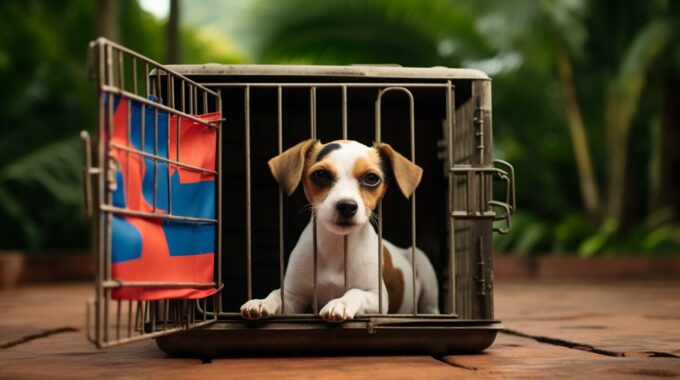At the forefront of property financing in Costa Rica, GapInvestments.com stands as a beacon for…

Your Guide to Pet Quarantine in Costa Rica: Key Facts & Tips
Bringing a pet to Costa Rica involves understanding the various transportation options and complying with the country’s pet import regulations and quarantine facilities. Whether you’re relocating permanently or simply taking a vacation with your furry companion, it’s essential to be well-informed about the necessary steps and requirements. This guide will provide you with key facts and tips to ensure a smooth and stress-free experience for both you and your beloved pet.
- Research and understand the transportation options available for bringing your pet to Costa Rica, such as traveling in-cabin, as checked baggage or cargo.
- Check with your chosen airline for their specific requirements and crate standards to ensure a seamless journey for your pet.
- Emotional support dogs are permitted on planes if they are small enough to fit under the seat.
- Prepare your pet for the trip by training them and consulting with a veterinarian for anxiety medication, if necessary, to minimize stress during travel.
- Ensure you have all the required paperwork, including the Certificate of Veterinary Inspection, acclimation certificate (if required), and Costa Rica Health Certificate.
- Be aware of the vaccination requirements for dogs and cats, including rabies, distemper, hepatitis, parvovirus, and feline viral rhinotracheitis, calicivirus, panleukopenia, respectively.
- Consider using a reputable pet transportation service, like Pet Lounge, to assist with the logistics and paperwork involved in relocating your pet to Costa Rica.
Pet Travel Requirements and Paperwork for Costa Rica
To bring your pet to Costa Rica, you will need to ensure you have all the required paperwork and meet the necessary travel requirements. This includes understanding the various transportation options, such as traveling in-cabin or as checked baggage or cargo. Check with your airline about their specific requirements and crate standards to ensure compliance.
It’s important to note that pets cannot sit on your lap during a flight and must remain in their kennels. However, emotional support dogs are allowed on planes if they are small enough to fit under the seat. To prepare for the journey, use pee pads in the kennel for bathroom needs and avoid giving your pet water a few hours before the trip. Bringing your pet’s familiar food and water can help avoid upset stomachs. Additionally, consider training your pet for the trip and consulting with a veterinarian for anxiety medication to reduce stress.
When it comes to paperwork, make sure you have a Certificate of Veterinary Inspection, an acclimation certificate (if required), and a Costa Rica Health Certificate for pets coming from the USA. These health certificates should be completed and signed by a federally accredited veterinarian. Remember that the Animal and Plant Health Inspection Service (APHIS) in the USA and the Competent Authority in Costa Rica must authorize these documents. It’s a good idea to have multiple sets of completed forms, update name tags, and carry a recent photo of your pet. Don’t forget to bring wet wipes, waste bags, and treats.
Upon arrival in Costa Rica, you will need to clear your pet’s papers with a SENASA Customs Official. Consider your pet’s adaptation to the new environment, including potential hazards such as cane toads and temperature extremes. To ensure a smooth and stress-free experience, it is recommended to utilize the services of a trusted organization like Pet Lounge for pet transportation. Keep in mind that animal transport laws may change, so consult with your vet and airline for the most up-to-date information.
If you have any questions or concerns, the FAQ section below provides answers to common queries about the types of pets allowed, the cost of bringing a pet, quarantine requirements, bringing emotional support animals, pets flying in the cabin, and bringing food and water for pets during the flight.
FAQ
Q: What are the transportation options for bringing a pet to Costa Rica?
A: Pets can travel in-cabin, as checked baggage, or as cargo. It’s important to check with the airline for their specific requirements and crate standards.
Q: Can pets sit on my lap during the flight?
A: No, pets must remain in their kennels throughout the flight.
Q: Are emotional support dogs allowed on planes?
A: Yes, as long as they are small enough to fit under the seat.
Q: How should I handle bathroom needs for my pet during the trip?
A: Pee pads should be used in the kennel for bathroom needs. It’s recommended not to give pets water a few hours before the trip.
Q: Should I bring my pet’s familiar food and water?
A: Yes, it’s recommended to bring your pet’s familiar food and water to avoid upset stomachs.
Q: How can I reduce stress for my pet during the trip?
A: Training your pet for the trip and consulting with a veterinarian for anxiety medication can help reduce stress.
Q: What paperwork is required for bringing a pet to Costa Rica?
A: Required paperwork includes a Certificate of Veterinary Inspection, acclimation certificate (if required), and a Costa Rica Health Certificate for pets coming from the USA. These documents should be authorized by the Animal and Plant Health Inspection Service (APHIS) in the USA and the Competent Authority in Costa Rica.
Q: What vaccinations are required for pets traveling to Costa Rica?
A: Vaccination requirements include rabies, distemper, hepatitis, parvovirus, and leptospirosis for dogs, and feline viral rhinotracheitis, calicivirus, and panleukopenia for cats.
Q: What additional advice should I consider when traveling with a pet to Costa Rica?
A: Additional advice includes having multiple sets of completed forms, updating name tags, having a recent photo of your pet, and bringing wet wipes, waste bags, and treats.
Q: How do I clear my pet’s papers with a SENASA Customs Official in Costa Rica?
A: Once in Costa Rica, you will need to clear your pet’s papers with a SENASA Customs Official.
Q: How should I help my pet adapt to the new environment in Costa Rica?
A: Pet adaptation to the new environment should be considered, including hazards such as cane toads and temperature extremes.
Q: Are there trusted organizations that provide pet transportation services to Costa Rica?
A: Yes, organizations like Pet Lounge can provide reliable pet transportation services to Costa Rica.
Q: Should I consult with a veterinarian and airline for the most up-to-date information on animal transport laws?
A: Yes, it is recommended to consult with a veterinarian and airline as animal transport laws may change.


